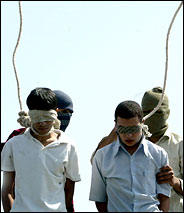 Executing Minors ... As yesterday's post should make clear, I'm generally too suspicious of absolute convictions to adopt beliefs which are at all immoderate or extremist.
Executing Minors ... As yesterday's post should make clear, I'm generally too suspicious of absolute convictions to adopt beliefs which are at all immoderate or extremist.When it comes to capital punishment, however, that truism no longer holds. I do not understand, in any way, how a society that expressly grants its citizens individual rights (all in the name of governmental fallibility, mind you) could nonetheless reserve for the government the right to terminate its citizens' lives.
So when it comes to capital punishment as applied to minors, let's just say there isn't a single issue less amenable to my own temperament or point of view.
Which brings me, however belatedly, to today's Times article on HRW's denouncement of two recent executions in Iran:
TEHRAN, July 28 - Human rights advocates have condemned the execution last week of two young men convicted of sexually assaulting a 13-year-old boy, calling it a violation of international law.
Mahmoud Asgari, left, and Ayaz Marhoni were prepared for execution on July 19 in Mashad after being convicted of sexually assaulting a boy.
The ages of the two men were not announced by Iranian officials at the time of the execution, which took place on July 19 in Mashad in northeast Iran. But Human Rights Watch said they were 18 and 19, and the younger man was a juvenile when the assault took place.
"Death is an inhumane punishment, particularly for someone under 18 at the time of his crimes," Hadi Ghaemi, an Iran researcher for Human Rights Watch, said in a statement issued Wednesday. "All but a handful of countries forbid such executions. Iran should as well."
What's missing here is the context. Typically the Times will, in reporting on a declaration by one particular organization, provide a history of past instances in which the organization has made similar declarations. But here they refrain -- ie, there's no mention of the fact that HRW has also denounced the U.S. for being among the "handful of countries" in question.
I'm aware that this is something of a trivial point to be making, especially in comparison to the awfulness of the executions themselves. And I can also appreciate that the Times adjusted its editorial process in order to abstain from moral equivocation. But it still troubles me that the periphery of this story is deliberately missing.
If you need a reminder of why it shouldn't be, just look at the picture above. Does the nationality of the two children at all change the morality of what is about to happen?

0 Comments:
Post a Comment
<< Home